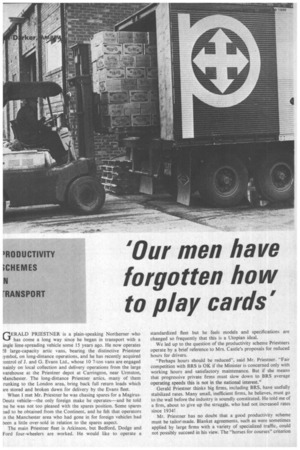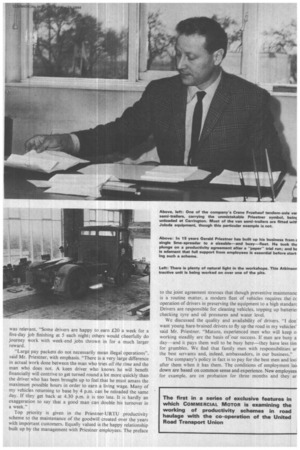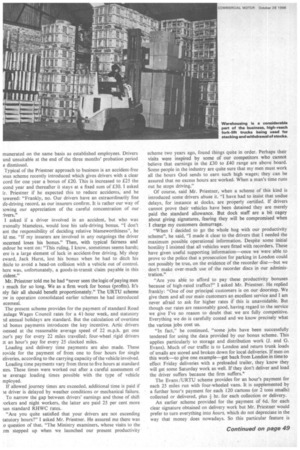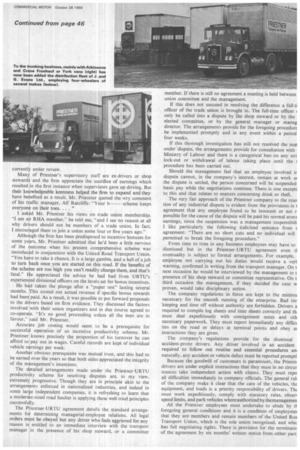'Our men have forgotten how to play cards'
Page 46

Page 47

Page 48

Page 51

If you've noticed an error in this article please click here to report it so we can fix it.
GERALD PRIESTNER is a plain-speaking Northerner who has come a long way since he began in transport with a ingle lime-spreading vehicle some 15 years ago. He now operates !8 large-capacity artic vans, bearing the distinctive Priestner ;ymbol, on long-distance operations, and he has recently acquired ;ontrol of J. and G. Evans Ltd., whose 10 7-ton vans are engaged nainly on local collection and delivery operations from the large varehouse at the Priestner depot at Carrington, near Urmston, v1anchester. The long-distance Priestner artics, many of them runking to the London area, bring back full return loads which tre stored and broken down for delivery by the Evans fleet.
When I met Mr. Priestner he was chasing spares for a MagirusDeutz vehicle—the only foreign make he operates—and he told -ne he was not too pleased with the spares position. Some spares lad to be obtained from the Continent, and he felt that operators .n the Manchester area who had gone in for foreign vehicles had been a little over-sold in relation to the spares aspect.
The main Priestner fleet is Atkinson, but Bedford, Dodge and Ford four-wheelers are worked. He would like to operate a standardized fleet but he feels models and specifications are changed so frequently that this is a Utopian ideal.
We led up to the question of the productivity scheme Priestners operate by a brief reference to Mrs. Castle's proposals for reduced hours for drivers.
"Perhaps hours should be reduced", said Mr. Priestner. -Fair competition with BRS is OK if the Minister is concerned only with working hours and satisfactory maintenance. But if she means that progressive private firms must slow down to BRS average operating speeds this is not in the national interest."
Gerald Priestner thinks big firms, including BRS, have usefully stabilized rates. Many small, inefficient firms, he believes, must go to the wall before the industry is soundly constituted. He told me of a firm, about to give up the struggle, who had not increased rates since 1934!
Mr. Priestner has no doubt that a good productivity scheme must be tailor-made. Blanket agreements, such as were sometimes applied by large firms with a variety of specialized traffic, could not possibly succeed in his view. The "horses for courses" criterion was relevant. "Some drivers are happy to earn £20 a week for a five-day job finishing at 5 each night; others would cheerfully do journey work with week-end jobs thrown in for a much larger reward.
"Large pay packets do not necessarily mean illegal operations-, said Mr. Priestner, with emphasis. "There is a very large difference in actual work done between the man who tries all the time and the man who does not. A keen driver who knows he will benefit financially will contrive to get turned round a lot more quickly than the driver who has been brought up to feel that he must amass the maximum possible hours in order to earn a living wage. Many of my vehicles returning to base by 4 p.m. can be reloaded the same day. If they get back at 4.30 p.m. it is too late. It is hardly an exaggeration to say that a good man can double his turnover in a week.
Top priority is given in the Priestner-URTU productivity scheme to the maintenance of the goodwill created over the years with important customers. Equally valued is the happy relationship built up by the management with Priestner employees. The preface to the joint agreement stresses that though preventive maintenanc is a routine matter, a modern fleet of vehicles requires the cc operation of drivers in preserving the equipment to a high standar( Drivers are responsible for cleaning vehicles, topping up batteries checking tyre and oil pressures and water level.
We discussed the quality and availability of drivers. "I don' want young hare-brained drivers to fly up the road in my vehicles' said Mr. Priestner. "Mature, experienced men who will keep o: working steadily are the basis of 'our success. If men are busy a day—and it pays them well to be busy here—they have less tim for grumbles. We find that family men with responsibilities ar the best servants and, indeed, ambassadors, in our business."
The company's policy in fact is to pay for the best men and lool after them when it has them. The conditions of employment lail down are based on common sense and experience. New employees for example, are on probation for three months and they ar munerated on the same basis as established employees. Drivers und unsuitable at the end of the three months' probation period e dismissed.
Typical of the Priestner approach to business is an accident-free >tins scheme recently introduced which gives drivers with a clear cord for one year a bonus of £20. This is increased to £25 the cond year and thereafter it stays at a fixed sum of £30. I asked Ir. Priestner if he expected this to reduce accidents, and he iswered: "Frankly, no. Our drivers have an extraordinarily fine de-driving record, as our insurers confirm. It is rather our way of lowing our appreciation of the careful concentration of our ivers."
I asked if a driver involved in an accident, but who was ;rsonally blameless, would lose his safe-driving bonus. "I don't ant the responsibility of deciding relative blameworthiness", he ld me. "If my insurers are involved in any outgoings the driver )ncerned loses his bonus." Then, with typical fairness and mdour he went on: "This ruling, I know, sometimes seems harsh; ere is a large element of luck in accident-free driving. My shop eward, Jack Hurst, lost his bonus when he had to ditch his :Iliac to avoid a head-on collision with a vehicle out of control. here was, unfortunately, a goods-in-transit claim payable in this cident."
Mr. Priestner told me he had "never seen the logic of paying men ) much for so long. We as a firm work for bonus (profits). It's nly fair all should benefit proportionately." The URTU scheme in operation consolidated earlier schemes he had introduced ecemeal.
The present scheme provides for the payment of standard Road aulage Wages Council rates for a 41-hour week, and statutory id annual holidays are standard. But the calculation of overtime id bonus payments introduces the key incentive. Artic drivers ssessed at the reasonable average speed of 22 m.p.h. get one Dues pay for every 22 miles travelled; four-wheel rigid drivers .!.t an hour's pay for every 25 clocked miles.
Loading and delivery time payments are also made. These rovide for the payment of from one to four hours for single eliveries, according to the carrying capacity of the vehicle involved. Loading time payments vary from three to five hours at standard ites. These times were worked out after a careful assessment of ie average loading times possible with the type of vehicle mployed.
If allowed journey times are exceeded, additional time is paid if le driver is delayed by weather conditions or mechanical failure.
To narrow the gap between drivers' earnings and those of shift iorkers and night workers, the latter are paid 25 per cent more ian standard RHWC rates..
"Are you quite satisfied that your drivers are not exceeding tatutory hours?" I asked Mr. Priestner. He assured me there was .o question of that. "The Ministry examiners, whose visits to the rm stepped up when we launched our present productivity scheme two years ago, found things quite in order. Perhaps their visits were inspired by some of our competitors who cannot believe that earnings in the £30 to £40 range are above board. Some people in the industry are quite sure that my men must work all the hours God sends to earn such high wages; they can be assured that no excess hours are worked. When a man's time runs out he stops driving."
Of course, said Mr. Priestner, when a scheme of this kind is introduced some drivers abuse it. "I have had to insist that undue delays, for instance at docks, are properly certified. If drivers cannot prove their• vehicles have been detained they are merely paid the standard allowance. But dock staff are a bit cagey about giving signatures, fearing they will be compromised when I charge my customers demurrage.
"When I decided to go the whole hog with our productivity scheme", he said, "I made it clear to the drivers that I needed the maximum possible operational information. Despite some initial hostility I insisted that all vehicles were fitted with recorders. These have given useful supporting information—once we were able to prove to the police that a prosecution for parking in London could not possibly be true, on the evidence of the recorder disc—but we don't make over-much use of the recorder discs in our administration."
"Are you able to afford to pay these productivity bonuses because of high-rated traffics?" I asked Mr. Priestner. He replied frankly: "One of our principal customers is on our doorstep. We give them and all our main customers an excellent service and I am never afraid to ask for higher rates if this is unavoidable. But though our rates are reasonably good, having regard to the service we give I've no reason to doubt that we are fully competitive. Everything we do is carefully costed and we know precisely what the various jobs cost us.
"In fact," he continued, "some jobs have been successfully tendered for using the data provided by our bonus scheme. This applies particularly to storage and distribution work (J. and G. Evans). Much of our traffic is to London and return trunk loads of smalls are stored and broken down for local deliveries. If men on this work—to give one example—get back from London in time to effect Friday deliveries with a preloaded trailer, they know they will get some Saturday work as well. If they don't deliver and load the driver suffers because the firm suffers."
The Evans AJRTU scheme provides for an hour's payment for each 25 miles run with four-wheeled vans. It is supplemented by a further hour's payment for each 120 cartons (or 2 tons smalls) collected or delivered, plus + hr. for each collection or delivery.
An earlier scheme provided for the payment of 6d. for each clear signature obtained on delivery work but Mr. Priestner would prefer to turn everything into hours, which do not depreciate in the way that money does nowadays. So this particular feature is
currentlY under review.
Many of Priestner's supervisory staff are ex-drivers or shop stewards and the firm appreciate the sacrifice of earnings which resulted in the first instance when supervisors gave up driving. But their knowledgeable keenness helped the firm to expand and they have benefited as a result. Mr. Priestner quoted the wry comment of his traffic manager, Alf Ratcliffe: "Your bscheme keeps everyone on their toes. . .
I asked Mr. Priestner his views on trade union membership.
am an RHA member," he told me, and I see no reason at all why drivers should not be members of a trade union. In fact, I encouraged them to join a union some four or five years ago."
Although the firm has been predisposed to incentive bonuses for some years, Mr. Priestner admitted that he'd been a little nervous of the Outcome when his present comprehensive scheme was introduced in conjunction with the United Road Transport Union. -You haVe to take a chance. It is a large gamble, and a hell of a job to turn back once you are started on this road. If the benefits of the scheMe are too high you can't readily change them, and that's fatal.He appreciated the advice he had had from URTU's experienced divisional officers on the levels set for bonus incentive's.
He had taken the plunge after a "paper test" lasting several months. This costed out actual revenue if specific bonus rewards had been paid. As a result, it was possible to put forward proposals to the drivers based on firm evidence. They discussed the factors involved with their union organizers and in due course agreed to co-operate. "It's no good proceeding unless all the men are in favour," said Mr. Priestner.
Accurate job costing would seem to be a prerequisite for successful operation of an incentive productivity scheme. Mr. Priestner knows precisely the proportion of his turnover he can afford to pay out in, wages. Careful records are kept of individual vehicle earnings per week.
Another obvious prerequisite was mutual trust, and this had to be earned over the years so that both sides appreciated the integrity of the management's intentions.
The detailed arrangements made under the Priestner-URTU productivity scheme for resolving disputes are, in my view, extremely progressive. Though they are in principle akin to the arrangements enforced in nationalized industries, and indeed in some large independent companies, it is refreshing to learn that a moderate-sized road haulier is applying these well-tried principles successfully.
The Priestner-URTU agreement details the standard arrangements for determining managerial-employee relations. All legal orders must be obeyed but any driver who feels aggrieved for any reason is entitled to an immediate interview with the transport manager in the presence of his shop steward, or a committee member. if there is still no agreement a meeting is held between union committee and the management.
If this does not succeed in resolving the difference a full-ti officer of the trade union is brought in. The full-time officer c only be called into a dispute by The shop steward or by the elected committee, or by the general manager or manag director. The arrangements provide for the foregoing procedure be implemented promptly and in any event within a period four weeks.
If this thorough investigation has still not resolved the mat under dispute, the arrangements provide for consultation with Ministry of Labour and there is a categorical ban on any stri lock-out or withdrawal of labour taking place until the I procedure has been carried out.
Should the management feel that an employee involved ir dispute cannot, in the company's interest, remain at work In the dispute is settled, the person concerned will be suspended basic pay while the negotiations continue. There is one excepti to this and that relates to matters concerning drink or theft.
The very fair approach of the Priestner company to the reso tion of any industrial dispute is evident from the provisions in 1 agreement that any employee found to be innocent or not r ponsible for the cause of the dispute will be paid his normal avers earnings, since the suspension was a management responsibili I like particularly the following italicized sentence from t agreement: "There are no short cuts and no individual will permitted to break the foregoing procedure."
From time to time in any business employees may have to dismissed but in the Priestner-URTU agreement even tl eventuality is subject to formal arrangements. For example, emPloyee not carrying out his duties would receive a vert warning, confirmed in writing from the transport manager. On t next occasion he would be interviewed by the management in t presence of his shop steward or committee representative. On t third occasion the management, if they decided the case w proven, would take disciplinary action.
The company regulations in force are kept to the minimu necessary for the smooth running of the enterprise. Bad tim keeping and time off without authority are forbidden. Drivers a required to compile log sheets and time sheets correctly and th, must deal expeditiously with consignment notes and 0th necessary paperwork. They must report immediately any diffiet ties on the road or delays at terminal points and obey at instructions 'they are given.
The company's regulations provide for the dismissal accident-prone drivers. Any driver involved in an accident required to follow out routine and essential procedures an naturally, any accident or vehicle defect must be reported prompt!
Because the goodwill of customers is paramount, the Priestn. drivers are under explicit instructions that they must in no circun stances take independent action with clients. They must repo all difficulties immediately to company officials. The general rul, of the company make it clear that the care of the vehicles, the equipment, and loads is a priority responsibility of drivers. Th( . must work expeditiously, comply with statutory rules, obser speed limits, and park vehicles where authorized by the managemen All the Priestner employees must undertake to abide by tt foregoing general conditions and it is a condition of employmet that they are members and remain members of the United Roa Transport Union, which is the sole union recognized, and whie has full negotiating rights. There is provision for the terminatie of the agreement by six months' written notice from either part:
























































































































